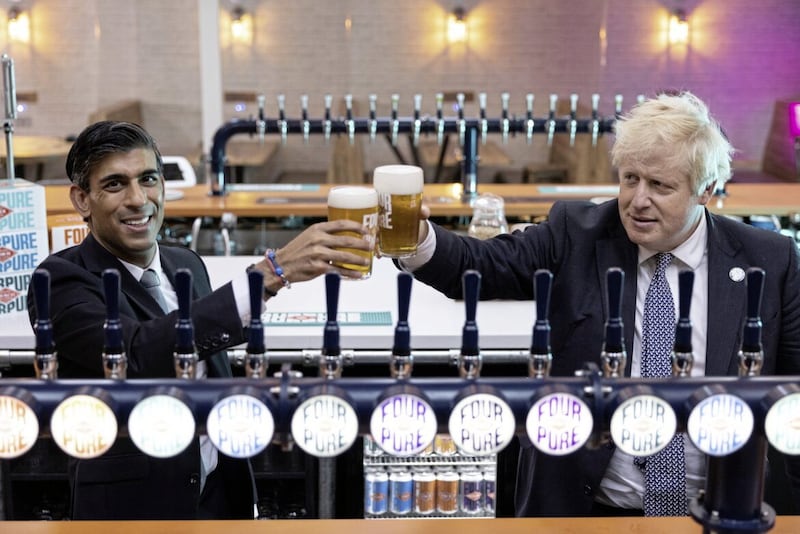It’s almost Christmas in Northern Ireland, which means that the ghosts of politics past, present and future have been bumping into each other at Hillsborough Castle; all trying to avoid eye contact with the ghost of ‘not a bloody chance, mate’ (otherwise known, in his earthly form, as Chris Hopeless-Hazard Warning).
The negotiating format has changed this year. Instead of a pantomime or re-imagining of A Christmas Carol, we’ve been treated to the political version of the 1993 film Indecent Proposal (some of you may need to google the plot), in which Hopeless-Hazard Warning tries to work out just how much money it will take to get the DUP to jump into the executive bed.
At the time of writing (Wednesday lunchtime) the DUP is still standing firm, insisting that it cannot be ‘bought’. That’s not to say that there aren’t people in the party who are tempted – sorely tempted, in fact – but yielding to that temptation also means facing down an assortment of internal and external purists who believe principles matter more than pounds.
They may have a point. The DUP agreed to a previous relationship with the Conservative Party in 2017 (which involved cash), only to find itself upended and shafted at just about every turn.
So it’s worth looking at and maybe learning the lessons from that experience. Theresa May didn’t bother telling it about the backstop deal she was trying to negotiate with the EU. The DUP then turned to the ERG and Boris Johnson, the Jim Trott wing of Conservativism (“No, no, no, no, no... yes”). Rishi Sunak promised to take DUP concerns seriously, only to deliver the Windsor Framework and a cementing into place of the key problems of the NI Protocol. There were hints of a Tory rebellion, but what materialised was a whopping majority in both the Commons and Lords.

Some DUP/loyalist tails were up after Suella Braveman and Priti Patel were talked of as possible leaders. Yes, those two. Braverman voted for the protocol and the framework (even though her resignation letter accused Sunak of betraying her over Liz Truss’s 2022 NI Protocol Bill). Patel voted for the protocol, later claiming she didn’t think it was likely to be a permanent part of the Withdrawal Act. And on Tuesday evening, during a critical vote on the Rwanda Bill, not a single Conservative MP voted against it, even though they know it creates problems for the DUP.
Former Labour MP Kate Hoey, who has been close to anti-protocol unionism/loyalism, tweeted, after confirmation that the European Commission had approved £20 million in UK state aid to companies in NI (‘in line with EU State aid rules made applicable by the Windsor Framework’): “How can any prime minister of the UK think this is right – giving up control to a foreign institution’?
How can any Prime Minister of the U.K. think this is right - giving up control to a foreign institution. Look out Gibraltar and look out the Falklands. If they can sell Northern Ireland out they will get round to selling you out eventually. https://t.co/ot3Qp61NpZ
— Kate Hoey (@CatharineHoey) December 12, 2023
The answer is brutally and uncomfortably simple. Sunak doesn’t care. Johnson didn’t care. The ERG doesn’t care. Braverman doesn’t care. Patel doesn’t care. The Conservative Party doesn’t care.
That whopping majority in the Commons and Lords who endorsed the Windsor Framework (which heard the arguments against it from the DUP in both Houses, along with Kate herself) doesn’t care. Labour and the Lib-Dems don’t care.
The concerns of ‘Ulster’ unionism generally and the DUP in particular are of no real concern to anyone at Westminster. As I’ve noted before, there is no emotional attachment any more from the Westminster end of the NI/GB relationship.
All of which makes life very difficult for the DUP. It knows that the seven tests cannot be delivered in full, which probably explains why any deal offered will now just be ‘measured’ against those tests. It knows, too, that the Windsor Framework (maybe with a tweak) is staying in place.
Crucially, it knows that it has few friends at Westminster; and even they have proved reluctant to risk their own careers and promotion opportunities by standing with them.


